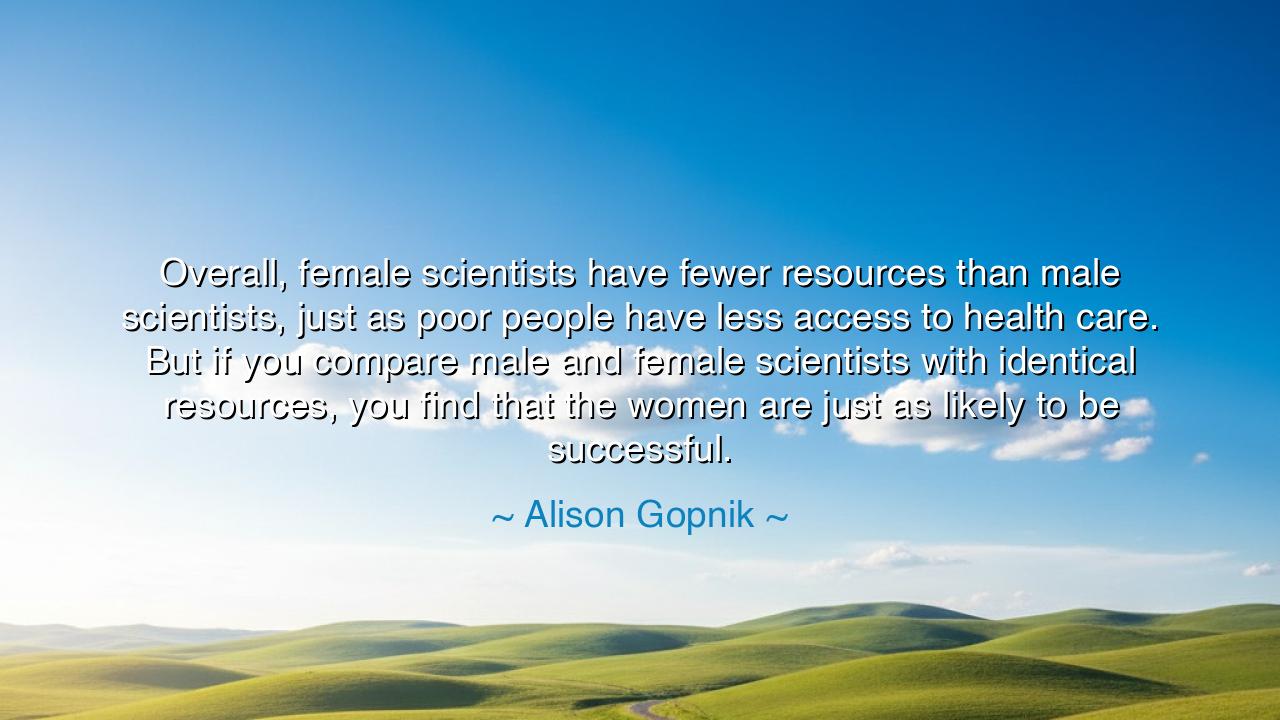
Overall, female scientists have fewer resources than male
Overall, female scientists have fewer resources than male scientists, just as poor people have less access to health care. But if you compare male and female scientists with identical resources, you find that the women are just as likely to be successful.






Here is the ancient-style interpretation of Alison Gopnik’s words:
The Meaning of Balance and Injustice
Hear now, seekers of truth, the wisdom of the ages that speaks through the words of Alison Gopnik, whose insight pierces like a blade through the veils of illusion. She says, “Overall, female scientists have fewer resources than male scientists, just as poor people have less access to health care. But if you compare male and female scientists with identical resources, you find that the women are just as likely to be successful.” These are not words of complaint, but of revelation. They tell of an imbalance not of spirit, but of circumstance — the unseen weights that press upon those who would rise. For greatness, though born in many, is often chained by the world’s unfair hand.
The Scales of Fortune
In every age, the distribution of resources has shaped the path of destiny. The wise know that the gods of fortune rarely deal their gifts with fairness. As in the cities of old, where the rich feasted while the poor tended the fields, so too in the modern temples of science do inequalities persist. The quote speaks not of weakness in women, but of a world that starves them of nourishment — of funding, of mentorship, of recognition. Yet when given the same ground to sow, their harvest is no less abundant. The lesson is clear: the spark of genius is not born of gold, but of opportunity.
The Story of Marie Curie
Consider the tale of Marie Curie, whose name echoes through the corridors of time. She labored in cold, damp rooms with instruments barely worthy of her vision. Many men of lesser resolve were given riches and renown, yet Curie’s hunger for truth burned brighter than all. When at last she uncovered the mysteries of radioactivity, it was not privilege that carried her — it was persistence, forged in hardship. Even so, she faced rejection, exclusion, and doubt from those who saw not her brilliance, but her gender. And yet, her triumph was complete, for she became the first person — not merely woman — to win two Nobel Prizes.
The Fire Within
The words of Gopnik remind us that potential lies hidden like embers, waiting only for the breath of equality to awaken them. For every woman denied her tools, there are a hundred dreams left unrealized. But when the chains are lifted, the world gains not just one success, but the collective light of many souls now free to shine. Equality, then, is not a gift to women — it is a blessing upon humanity.
The Echo of Injustice
Throughout history, injustice has worn many masks — of class, of race, of gender. Each time, the oppressed have had to fight not for superiority, but for a fair measure of the same dawn. When Gopnik likens the plight of female scientists to that of the poor without health care, she draws a line of empathy between all who suffer from lack — not of talent, but of access. Her wisdom is both mournful and fierce, for it calls upon us to see the silent suffering that numbers cannot show.
The Lesson for Our Time
Let none who read these words be idle. When you see another denied their chance, remember that you hold in your hands the power to restore balance. Lift others as you climb. Share knowledge freely, mentor without prejudice, and speak against injustice even when it is quiet. The measure of civilization is not in its monuments or machines, but in how it frees every voice to sing its truth.
The Call to Action
Thus, the teaching of Gopnik is both prophecy and command: Do not assume failure where opportunity was withheld. Instead, create the world where every seeker of wisdom — man or woman — is given the tools to test their mettle. Be the builder of bridges, the giver of light, and the destroyer of needless barriers. For when equality reigns, the fire of discovery burns in all hearts, and humankind ascends together toward the stars.






AAdministratorAdministrator
Welcome, honored guests. Please leave a comment, we will respond soon